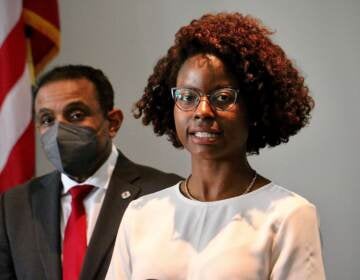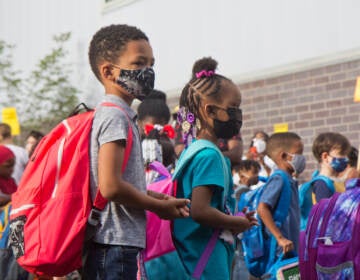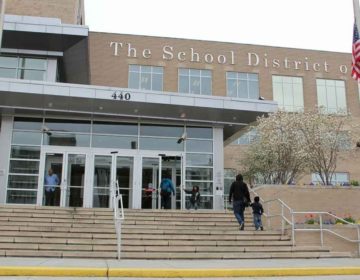Philly plans to offer in-person K-2 classes in February — making third attempt at reopening
The new plan calls for pre-K through grade 2 students to return on Feb. 22. But there are signs that the city’s teachers union will oppose.
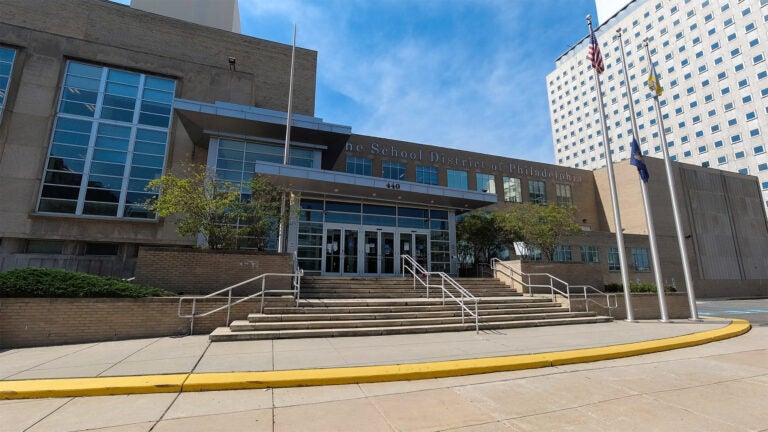
Philadelphia School District headquarters on North Broad Street. (Mark Henninger/Imagic Digital)
Ask us about COVID-19: What questions do you have about the current surge?
For the third time since the start of the pandemic, Philadelphia’s public school system unveiled a plan to bring some students back to classrooms.
The School District of Philadelphia announced Wednesday that some students in pre-K through grade 2 would return to their buildings twice a week starting on Feb. 22. All staff required to make that transition would report on Feb. 8.
The roughly 120,000 students in Pennsylvania’s largest school district have not had the option to learn in person since last March — more than 10 months ago.
“Some of our most vulnerable students, including younger learners, are at risk of falling behind,” said Superintendent Dr. William Hite in a statement. “Escalating violence and feelings of isolation are all tragic consequences of the pandemic, further threatening the health and well-being of our young people. Resuming in-person learning opportunities is a crucial step to help restore a much-needed sense of familiarity, community and connectedness for students and families.”
The district attempted to reopen schools in August, but ran into stiff community opposition. Officials abandoned a second attempt later in the fall because of rising COVID-19 case numbers.
During that second attempt, school leaders asked K-2 parents if they wanted their children to attend school twice per week in person or if they wanted their children to continue learning online only.
About a third of parents chose the in-person option. Those same families are the ones who will be eligible to return in person on Feb. 22. Families who chose all-virtual or who didn’t respond to the survey in November will have to remain all-virtual until “a later date when we can phase in more students,” the district said in a press release.
The district says it has done ventilation analysis to determine which rooms are safe for occupancy and for how many people. It also touts “inventories” of PPE and plexiglass barriers, among other mitigation strategies.
For students who choose to return, most schools will follow a staggered AA/BB schedule. Families that opt-in could then return to fully virtual school at any time, but couldn’t reverse course back into classrooms at will.
A crucial question is whether staff will support the plan.
The Philadelphia Federation of Teachers (PFT) recently said that the district should wait until teachers are vaccinated before reopening schools. The union earlier signed an agreement supporting an opening without vaccines under certain conditions, but says it changed its position as new strains of COVID-19 have emerged and vaccination became a reality.
City officials say it will be at least a few weeks before teachers start getting vaccinated, meaning it will likely be at least a couple of months before staff would be fully inoculated. The timeline, however, is hazy.
There is no word yet on whether the city might prioritize the vaccination of staff who work with younger students.
Asked Wednesday if waiting for teachers to be fully vaccinated might jeopardize a return to in-person learning this school year, Hite replied with a quick “Yes.”
He said the slow roll out of the vaccine and potential hesitance among some staff to get shots could push back the timeline for full inoculation. Although there’s still no official word yet on when teachers might start to get vaccinated.
Jerry Jordan, head of the Philadelphia Federation of Teachers, disagreed with that assessment. He’s hopeful that an accelerated vaccine roll out under the new federal administration will ensure staff get shots well before the school-year ends.
There are already some administrators working in person in Philadelphia schools. An official said Wednesday that some of them had returned positive tests, but those were all considered false positives after follow-up testing.
The district will not mandate vaccines for staff, but is encouraging eligible employees to get vaccinated as soon as possible.
If the district is successfully able to bring back select PreK-2 students, the next group of students to return would be those “complex needs,” Hite said Wednesday. That group includes English language learners and those with special-education plans. After that would be students who are enrolled in career-and-technical education programs, which tend to rely heavily on hands-on activities.
There is no timeline or plan, right now, for general education students in grades 3-12 to return to the classroom.
“We want to see how this will go first,” Hite said.
While the majority of American school districts have some form of in-person learning, according to NPR, a significant minority have been all-virtual since the pandemic began. Many of those districts, like Philadelphia, are in large cities with older school buildings.
Scientists have scrambled from the pandemic’s earliest days to determine just how much viral risk an open school presents.
A pair of recent studies by scientists from the Centers for Disease Control and Prevention suggested that schools do not drive community transmission. Scientists from the Children’s Hospital of Philadelphia recommended that schools reopen, with one leading researcher saying that children may be safer in school than they are in the wider community. And the state of Pennsylvania recently changed its guidance to say that officials could open elementary schools even in areas with the highest levels of COVID transmission.
Contrasted with the high cost of keeping children out of school, that emerging evidence has convinced some city leaders — such as those in Washington D.C. and Chicago — to push hard for reopening.
“We are science-based. The evidence is clear, said Gail Carter-Hamilton with the Philadelphia Department of Health. “It’s very rare to see outbreaks at schools.”
But some scientists say it’s better at this point to wait for staff vaccinations. Plus, Philadelphia has a long history of building hazards related to lead, asbestos, and other hazards. That history has frayed trust between staff and the district.
In a statement Wednesday, the Philadelphia Federation of Teachers said the school district had not provided suitable assurances around classroom ventilation and repeated its calls to vaccinate teachers before they return.
“We still have concerns, particularly in the area of ventilation,” said PFT president Jerry Jordan.
The school district said Wednesday that to reopen schools for PreK-2 students would require around 9,000 staff to be on site.
“We know that students learn best in person,” the PFT said on twitter. “But community spread is very high.”
The PFT and district signed a memorandum last year outlining the conditions that would constitute a safe reopening. Jordan said that if the two sides cannot agree on whether the conditions of their prior agreement have been satisfied, the district and PFT would go to a third party who acts like an arbitrator.
A PFT spokesperson declined to say whether the union would consider a strike.
The school district said Wednesday that to reopen schools for PreK-2 students would require around 9,000 staff to be on site.
“We know that students learn best in person,” the PFT said on twitter. “But community spread is very high.”
There’s also the unpredictable course of the virus itself. In Philadelphia and across the nation it does seem as though transmission rates are falling, though they are still higher than they were over the summer.
This is a developing story and will be updated.
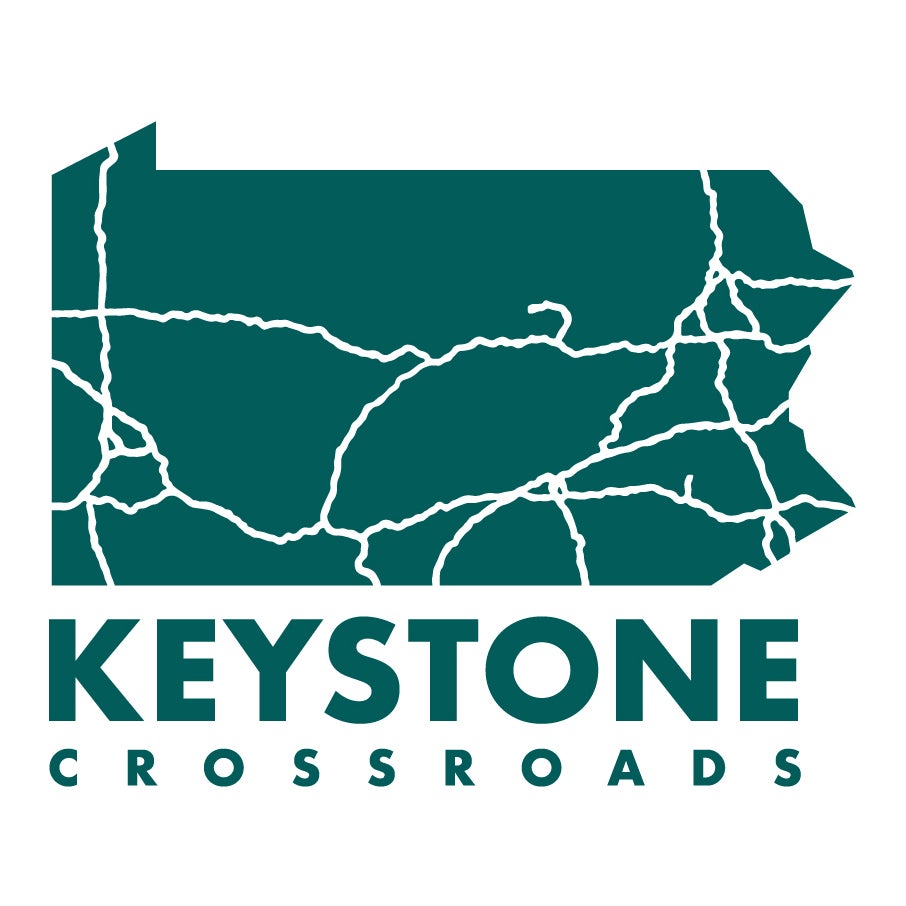
Get more Pennsylvania stories that matter
WHYY is your source for fact-based, in-depth journalism and information. As a nonprofit organization, we rely on financial support from readers like you. Please give today.




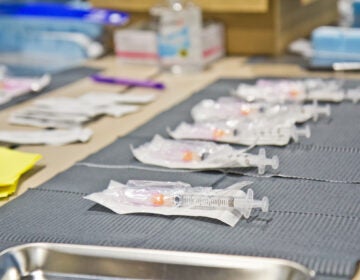

![CoronavirusPandemic_1024x512[1]](https://whyy.org/wp-content/uploads/2020/03/CoronavirusPandemic_1024x5121-300x150.jpg)
